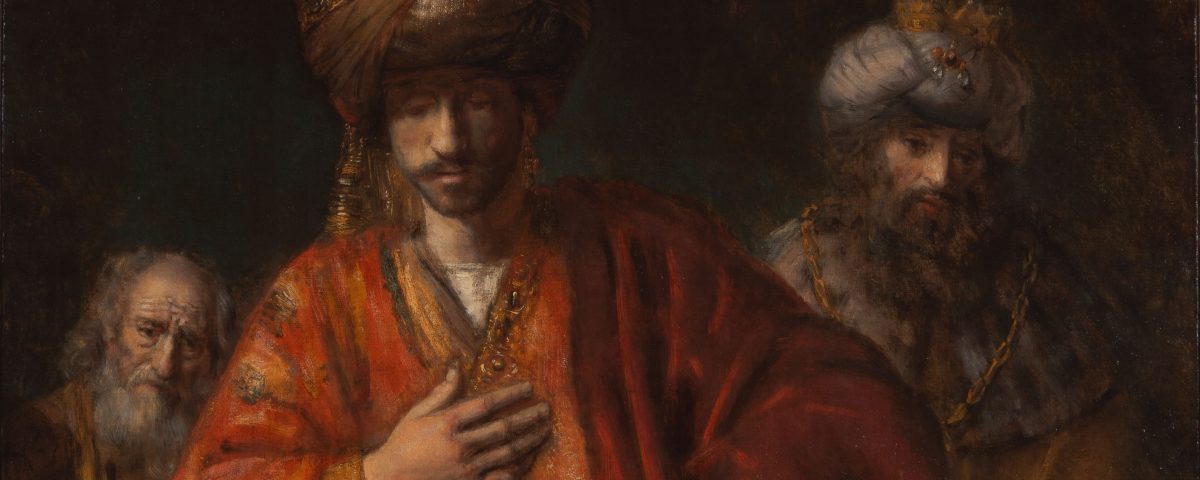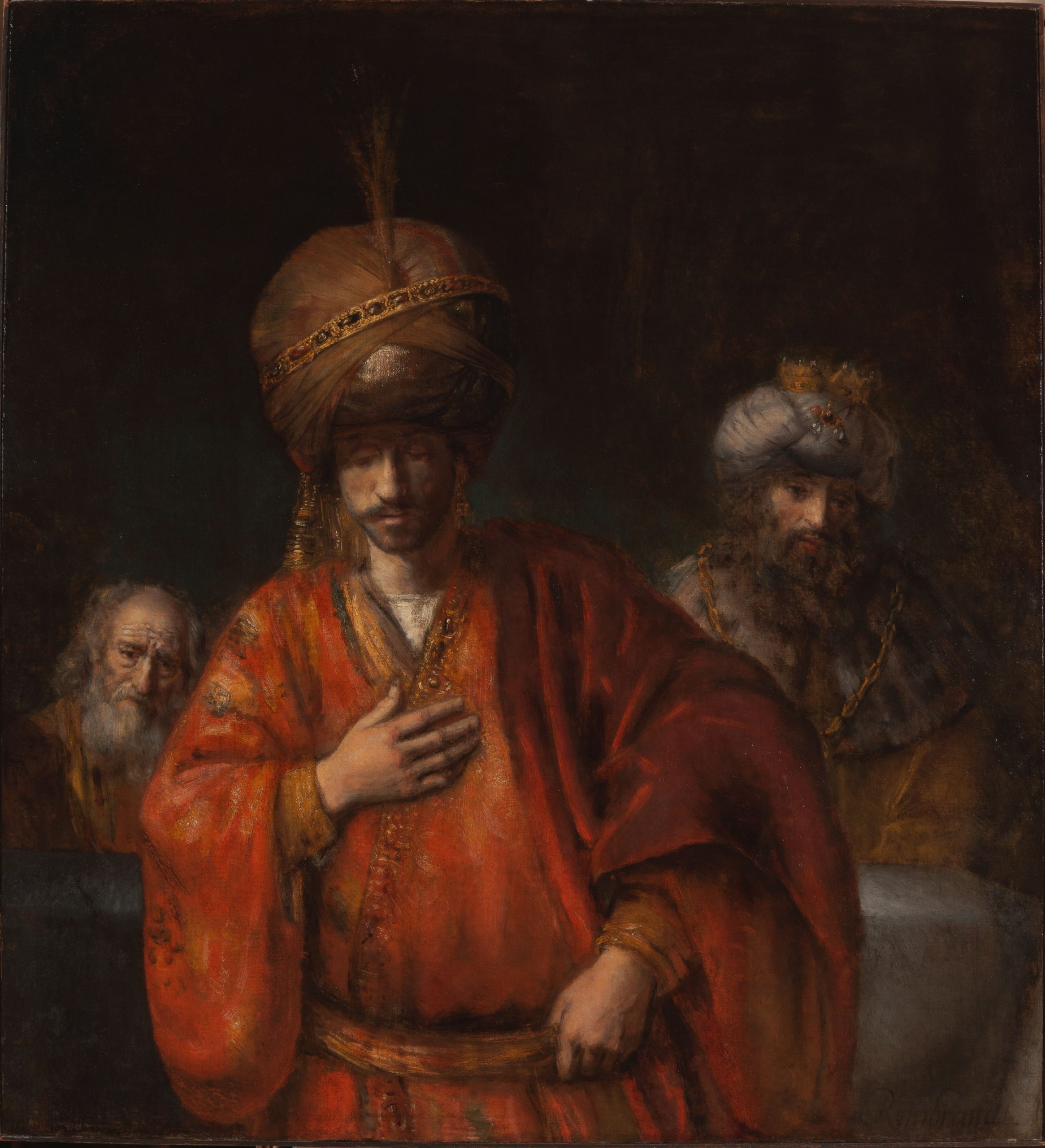Haman’s Last Will and Testament


Rembrandt, “The Fall of Haman,” c. 1660 (Hermitage Museum, St. Petersburg)
In 1703 in Livorno in central Italy, David Raphael ben Abraham Polido published Zikhron Purim, subtitled: The last will and testament of Haman ben Hamdata and his children, the enemies of the Jewish People.[i] In this inventive booklet, Polido imagined Haman imprisoned on death row, his execution only hours away, contemplating his fate. What might he have said? What might he have instructed his family?
Polido imagined a Haman who lay chained, dejected, and completely unrepentant. The text opens: “On the sixteenth of Nissan in the year 3,998, we, the undersigned, testify that [Haman] was visited in prison and we found him sick, on the ground dejected [cf. Psalms 41:4], crying and pleading for his life.” Despite this, the witnesses reported that Haman was “in full control of his mental faculties,” which enjoins the reader to take Haman’s words with the utmost seriousness. “You are aware that the king has sentenced me to hang in a most ignoble manner; therefore, I call upon you to act as witnesses to my testament.”
Haman begins with some general guidelines as to how his ten sons should live the remainder of their lives.
Lend your ears to my will, for it is the path of your lives. Love one another and live together in tranquility. “For how good and how pleasant it is for brothers to live as one” (Psalms 123:1). Hate the Jews as your father has commanded you, for they are your enemies. Write hateful letters about them to King Ahasuerus…. And so harden your heart against the poor, and copy the way of your ancestors…if you ever lend money to others arm yourselves and demand repayment. And if they tell you “we will repay you, only let Heaven have mercy upon us,” then spill their blood like water. Kill them without mercy and make a name for yourselves. For how good and how pleasant it is for brothers to destroy others and be free of the worms.
Some of these imagined words of Haman echo the Talmud, where, in an anonymous baraita, Canaan, the cursed son of Noah, also left instructions for his descendants: “Canaan commanded his sons about five matters: Love one another, love robbery, love promiscuity, hate your masters, and do not speak the truth” (Pesahim 113b).This is, of course, an exercise in rabbinic fantasy, but just in case one would presume that Canaan actually said this, Rashbam, notes the following in his commentary:
This means that [slaves descended from Canaan] act in this way—as if they had once been commanded by their ancestor to do so. And this has a practical ramification: that we are on alert when around them.
After these remarks, Haman addresses each son, in a parody of the blessings that Jacob gave to his sons and of the Ten Commandments themselves:
To Parshandata his firstborn. Do not pay any attention to the first of the Ten Commandments. “I am the Lord your God” does not apply to you, because you were never in Egypt and the Torah was not given to us. Neither did we hear the voice of God on Sinai saying, “I am God.” Moreover, while in Egypt Moses said “this is what the God of the Hebrews has said.” Now had he said “the God of the Amalakites” we would certainly have been included “in the curse of those who do not uphold” (Deut. 27:26). I bequeath you a double portion as it is written “the first born of a wife whom you hate should receive a double inheritance” (cf. Deut. 21:15-17).
Each son is given instructions as to which one of the Ten Commandments to break. Wherever he can, Haman leaves precise instructions to rebel against the norms of society that the Torah has outlined.
[Haman] called to [his fifth son] Adaliah and he quoted [the fifth of the Ten Commandments:] “honor your father”—if you know who he is. And if you do not, then act like R. Bena’ah [in the Talmud] and bury him, or hit him with your staff. For in the Gemara it was R. Huna who declared “most Gentile women are whores.”[2]
The two versions of Zikhron Purim that I examined share much of the opening text and Haman’s specific guidance to each of his ten sons. But they also differ. In the handwritten version held in Amsterdam, there follows the prayer for the welfare of the government which rather remarkably includes Shabbatai Zevi (“may his name be forever”; cf. Psalms 72:17). Both versions then have a parody of the Memorial Prayer for the Dead (“El Malei Rahamim”):
May the spirit of Satan guide him through the fires of hell… may the Supreme King of the Demons in his mercy fly above him and spread the shadow of death over him…may Ashmadi be his inheritance, may thorns afflict him (cf. Ezekiel 28:24) and may anger come upon his resting place, as it is written “may fury come, may his grave be obliterated” (cf. Isaiah 57:2)…together with all those who hate Israel, with every kind of curse, and may it be His will, and let us say Amen.
For good measure, both copies also have seven “hakafot for Haman.” The opening rhyming stanza reads: “I invoke the living God to excommunicate him; May those who hate Him [God] be removed from the source of life, and forever banished from the land of the living, and may his soul mourn and be forgotten from the living.” And so on.
How are we to read Polido’s work today? Over a century ago, Israel Davidson read it as a parody, which he defined as “a composition in which the form and expression of grave or dignified writings are closely imitated, but are made ridiculous by the subject or method of treatment.”[3] And Davidson thoroughly disliked it, declaring it to be “hardly worth the name of literature. It consists of curses and maledictions hurled at the head of Haman, the symbolic enemy and oppressor of the Jewish people…. Euphony is mistaken for thought, and paranomasia for humor…. We can see, as it were, the face of the poor, shabby scribbler brighten up as he labors over his puns, amused at his ingenuity in telling people what he needed without asking them for it.”[4] But reading it today, as we observe a second Purim while at war, with our family held hostage and our dead denied a Jewish burial, perhaps this assessment should be reevaluated. Jewish life in Livorno was, for the first time in a century, experiencing a renaissance and was relatively safe. Many even prospered. But David Polido, like Rashbam before him, reminded his contemporaries that even if an enemy is vanquished, hatred of the Jews endures. The lesson for moderns is clear.
Dr. Jeremy Brown is Director of the Office of Emergency Care Research at the National Institutes of Health.
[1] For background see Israel Davidson, Parody in Jewish Literature (Columbia University Press, 1907), 48–49, 195–199, and Roni Cohen, “Parodic Purim Literature in the Early Modern Era and the Ban that Failed” )Hebrew), Zion 88 (2023), 103-128. See also Moritz Steinschneider, Catalogus Liborium Hebraeorum in Bibliotheca Bodleiana (Berlin, 1852–60), col. 855. Zikaron Purim was published in different versions (Steinschneider mentions two possible publication dates, 1700 and 1703). In a manuscript copy held by the Ets Haim Bibliotheca Sefardica in Amsterdam (and available through the National Library of Israel) the entire text is handwritten, but at the end there is a ten-page printed Spanish poem that tells the Purim story. Another version contains fifteen pages of text, of which four (including the frontispiece and introduction) are handwritten. A definitive study of this work awaits.
[2] This is a fabrication placed into the mouth of Haman. However, the phrase does appear in the commentary of Rabbi Eliyakim Gatinov (c. 1725-1795) of Izmir, in his Yitzhak Yeranen, a commentary on Maimonides’ Mishneh Torah (Issurei Bi’ah 12:21).
[3] Davidson, op cit., xiv.
[4] Ibid., 49.
